- Home
- Robin LaFevers
Mortal Heart
Mortal Heart Read online
Table of Contents
Title Page
Table of Contents
Copyright
Map
Dedication
Dramatis Personae
Chapter One
Chapter Two
Chapter Three
Chapter Four
Chapter Five
Chapter Six
Chapter Seven
Chapter Eight
Chapter Nine
Chapter Ten
Chapter Eleven
Chapter Twelve
Chapter Thirteen
Chapter Fourteen
Chapter Fifteen
Chapter Sixteen
Chapter Seventeen
Chapter Eighteen
Chapter Nineteen
Chapter Twenty
Chapter Twenty-One
Chapter Twenty-Two
Chapter Twenty-Three
Chapter Twenty-Four
Chapter Twenty-Five
Chapter Twenty-Six
Chapter Twenty-Seven
Chapter Twenty-Eight
Chapter Twenty-Nine
Chapter Thirty
Chapter Thirty-One
Chapter Thirty-Two
Chapter Thirty-Three
Chapter Thirty-Four
Chapter Thirty-Five
Chapter Thirty-Six
Chapter Thirty-Seven
Chapter Thirty-Eight
Chapter Thirty-Nine
Chapter Forty
Chapter Forty-One
Chapter Forty-Two
Chapter Forty-Three
Chapter Forty-Four
Chapter Forty-Five
Chapter Forty-Six
Chapter Forty-Seven
Chapter Forty-Eight
Chapter Forty-Nine
Chapter Fifty
Chapter Fifty-One
Chapter Fifty-Two
Chapter Fifty-Three
Chapter Fifty-Four
Chapter Fifty-Five
Chapter Fifty-Six
Chapter Fifty-Seven
Chapter Fifty-Eight
Author’s Note
His Fair Assassin trilogy
About the Author
Copyright © 2014 by Robin LaFevers
All rights reserved. For information about permission to reproduce selections from this book, write to Permissions, Houghton Mifflin Harcourt Publishing Company, 215 Park Avenue South, New York, New York 10003.
www.hmhco.com
Map by Cara Llewellyn
The Library of Congress has cataloged the print edition as follows:
LaFevers, Robin.
Mortal heart / by Robin LaFevers.
p. cm. — (His fair assassin ; book 3)
Summary: Annith’s worst fears are realized when she discovers that, despite her lifelong training to be an assassin, she is being groomed by the abbess as a seeress, to be forever shut up in the convent of Saint Mortain.
ISBN 978-0-547-62840-0
[1. Convents—Fiction. 2. Nuns—Fiction. 3. Assassins—Fiction. 4. Death—Fiction. 5. Gods—Fiction. 6. Brittany (France)—History—1341–1532—Fiction. 7. France—History—Charles VIII, 1483–1498—Fiction.] I. Title.
PZ7.L14142Mor 2014
[Fic]—dc23
2014001877
This is a work of fiction. Names, characters, and incidents are the product of the author’s imagination, except in the case of historical figures and events, which are used fictitiously.
eISBN 978-0-547-63056-4
v1.1114
For Mark,
Again.
And always.
But especially for the last two years.
Dramatis Personae
At the Convent
ANNITH, a novitiate of Mortain
SYBELLA D’ALBRET, handmaiden to Death
ISMAE RIENNE, handmaiden to Death
ABBESS OF SAINT MORTAIN (formerly Sister Etienne)
SISTER EONETTE, convent historian and archivist
SISTER THOMINE, martial arts instructor
SISTER SERAFINA, poisons mistress
SISTER WIDONA, stable mistress
SISTER BEATRIZ, instructor in womanly arts
SISTER CLAUDE, sister in charge of the rookery
SISTER VEREDA, convent seeress
SISTER ARNETTE, arms mistress
DRAGONETTE, former abbess of Saint Mortain (deceased)
SISTER APPOLLONIA, former convent historian and archivist (deceased)
SISTER MAGDELENA, former poisons mistress (deceased)
SISTER DRUETTE, former seeress (deceased)
MATELAINE, a novitiate of Mortain
SARRA, a novitiate of Mortain
AVELINE, a novitiate of Mortain
LOISSE, a novitiate of Mortain
LISABET, a novitiate of Mortain
AUDRI, a novitiate of Mortain
FLORETTE, a novitiate of Mortain
The Hellequin
BALTHAZAAR
MISERERE
BEGARD
MALESTROIT
SAUVAGE
MALIGNE
Followers of Saint Arduinna
FLORIS, a priestess of Arduinna
AEVA
TOLA
ODILA
The Breton Court and Nobility
ANNE, duchess of Brittany, countess of Nantes, Montfort, and Richmont
ISABEAU, her sister
DUKE FRANCIS II, Anne’s father (deceased)
GAVRIEL DUVAL, a Breton noble
BENEBIC DE WAROCH, the Beast of Waroch and knight of the realm
VISCOUNT MAURICE CRUNARD, former chancellor of Brittany
JEAN DE CHALON, Prince of Orange
CAPTAIN DUNOIS, captain of the Breton army
PHILLIPE MONTAUBAN, chancellor of Brittany
BISHOP OF RENNES
FATHER EFFRAM
CHARLES VIII, king of France
ANNE DE BEAUJEU, regent of France
NORBERT GISORS, French ambassador
MAXIMILIAN OF AUSTRIA, the Holy Roman emperor, Anne’s husband
The Nine
MORTAIN, god of death
DEA MATRONA, mother goddess
ARDUINNA, goddess of love’s sharp bite, daughter of Matrona, twin sister of Amourna
AMOURNA, goddess of love’s first blush, daughter of Matrona
BRIGANTIA, goddess of knowledge and wisdom
CAMULOS, god of battle and war
MER, goddess of the sea
SALONIUS, god of mistakes
CISSONIUS, god of travel and crossroads
Chapter One
BRITTANY, DECEMBER 1488
FOR MOST, THE BLEAK DARK months when the black storms come howling out of the north is a time of grimness and sorrow as people await the arrival of winter, which brings death, hunger, and bitter cold in its wake. But we at the convent of Saint Mortain welcome winter with open arms and hearts, for it is Mortain’s own season, when He is full upon us. In such a way does the Wheel of Life turn, with every ending but a new beginning; that is the promise Mortain has made us.
So while most people bar their doors and shut their windows tight, we have cause for celebration and go traipsing through the wood, gathering the sacred yew branches and collecting holly with its bright red berries that remind us of the three drops of blood spilled when Mortain was pierced by love and Arduinna’s own arrow.
And while Mortain is a far more gentle god than most people give Him credit for, I do not think He would look kindly upon His youngest handmaidens jousting with the sacred branches that are intended for His holy fire.
“Audri! Aveline! Stop that!”
“She started it,” Aveline says, peering out from under the pale red hair that has fallen across her eyes.
“No, I didn�
�t! You did. You always do. Because you’re good with swords and knives and fighting, you always want to fight.”
“Girls!” I clap my hands, wincing at how very much I remind myself of Sister Beatriz when she loses control of the womanly-charms lessons. “Enough. Audri, go help Florette. Aveline, you come over here with me.”
Thinking the other girl in trouble, Audri sticks her tongue out at Aveline, then hurries over to help Florette. Instead of scolding Aveline, I take her hand, lead her to a holly bush, and give her a knife. “You will fill that basket, and I will fill this one.”
Pleased at being given a blade, something normally reserved for older girls or the training yard, Aveline turns to the bush and begins cutting.
I keep my eyes on the leaves in front of me as I speak to her. “You are the oldest of the group, Aveline. There is no honor in besting those younger than you.”
She stops her cutting and turns her strange, solemn gaze on me. “Are you saying I should pretend to be weak so they can feel strong? Is that not telling a lie?” Before I can untangle her knotted logic, she shrugs. “Besides, she is nearly as old as I am and likes to show off by going without her cloak and shoes.”
I hide a smile, for it is true that Audri is quite proud of her ability to withstand cold. Not only does she not feel the wintry chill, but she does not suffer chilblains or deadened limbs when exposed to it. That is her gift for being pulled from the womb of a woman who had frozen to death in one of winter’s most savage storms. She is as impervious to the cold as one of the great white bears of the far north, and proud of it. “That may be true,” I concede, “but you have gifts every bit as glorious as hers and you constantly pick fights so that you may show them off.”
For a moment, the old familiar wave of loss and longing rears up and I catch my breath at the pain of it. Among the handmaidens of Death our birth stories are our most treasured possessions, marking us as they do as Death’s true daughters. But on the day that I was born, no cuckolded husband paced nearby, no herbwitch pulled me from a cold, dead womb, nor did any hedge priest administer the last rites to a dying mother while I rooted futilely at her breast.
Or at least, I think not, for the truth is that I do not even know the day on which I was born. I do not know the manner of my birth, the name of my mother, or even if she still lives, although we think she must not, else I would not have ended up on the convent’s doorstep when I was less than a week old. Of all the women whose feet have pattered along these stone floors, I am the only one to have no inkling of the circumstances of my own birth.
It is like an itching, festering wound I have trained myself not to scratch. But some days the pain and burn of it are nearly beyond bearing. Especially when I am confronted with a cocksure nine-year-old who is blessed with reflexes so fast she has been known to snatch arrows from their flight.
Aveline keeps her attention on the holly but watches me from the corner of her eye. “Does that mean you will let me fight you sometime?”
I cannot help it—I laugh. “You think you can best me?”
She lifts one shoulder. “I think I would like to know if I could or could not.”
At her words, my smile wobbles and it is all I can do to keep from throwing my knife down in defeat. Even this child thinks I am no longer a match for her. I carefully avoid looking out at the ocean, just beyond the trees. It is too painful a reminder that both Ismae and Sybella have been sent to places I have not, have begun to fulfill their destinies while I am stuck here playing nursemaid to a gaggle of budding assassins.
I feel a tug at the corner of my gown and look down to find Florette standing there with wide eyes. “We did not mean to make you sad, Annith.”
“Oh, you didn’t, sweeting. I am just”—what? Feeling sorry for myself? Pining for my friends? Wishing fate had dealt me a different hand?—“eager to finish up with these branches so we can begin decorating.”
Her small face clears and she goes back to her own work while I move on to the next branch. It is hard—so hard—not to feel wasted, like a new sword that has been allowed to rust before it has ever been used. I tighten my grip on my blade, reminding myself that the abbess has assured me it is just one of Mortain’s many mysteries, why He has called the others first. If I ever come face to face with Him again, I shall ask why.
Politely, of course.
“Annith?” Aveline says.
“Hmmm?”
“Are we supposed to chop at our branches like that?”
I look down, appalled to see the gouges and scars where I have hacked my knife, again and again, against the pale silver bark of the yew. Saints! “No! Of course not. It is simply that this knife needs to be sharpened.”
She arches one of her pale red brows at me, looking far older than her nine years.
“Annith! Look!” At the sound of Florette’s shouting, I turn around to find her pointing through the small copse of trees. Is it a crow? For I have promised to pay Florette if she alerts me whenever she sees one approaching. It is our little secret. In exchange, I change the sheets on her bed when she wets it and I tell no one, although I think many of the others suspect.
I hurry to the trees, my eyes scanning the sky, but I see nothing.
“No, not in the sky, in the water. It’s a boat.”
I jerk my gaze down to the horizon, where I see that Florette is correct: a boat is making its way to the island. There is a quick, sharp stab of fear in my gut until I see that the boat does not bear one of the ominous black sails that portend death. “Aveline, go find Sister Thomine and Sister Widona. Tell them a night rower has arrived. Audri, you stay here with the other girls and continue gathering the greenery.”
I slip my knife into the sheath at my waist, lift my skirts, and hurry across the rocky beach to the landing. There are two men in the boat, the rower and one other—a hedge priest, I presume. A girl sits between them. She is small, small enough that I do not think she can be older than Audri or Florette. As the boat comes steadily closer, I see that her hands are tied, and a rope is around her waist, securing her to the boat.
The night rower meets my furious gaze. “You can quit yer glaring, missy. We tied ’er up only so she wouldn’t jump into the water. Thinks she’s a fish, she does.” I blink in surprise and turn to the hedge priest for an explanation.
He nods in greeting. “It’s true. The locals sent her to Saint Mer at first, thinking she was one of theirs. But the abbess took one look at her and knew she wasn’t. Turns out, her mother drowned, but they found her in time to cut the child from her womb. Except then the father wanted nothing to do with her. Thought she’d caused the mother’s death.”
Her story, like most of the girls’ stories, twists my heart. So many mothers dead, so many daughters blamed. It is almost enough to make me glad I do not know the circumstances of my own birth. What sort of death did my mother suffer? What sins were blamed on me for daring to come into this world?
“Well, you’re ashore now, so untie her at once. What’s her name?”
The hedge priest shoots an uneasy glance at the rower as he unties her. “Melusine,” he says. The sailor lifts the sacred conch shell he wears around his neck to his lips.
When I roll my eyes, it is his turn to glare at me. “’Tis a bad-luck name, miss. Especially for us sailors.”
“It is a foolish name,” the hedge priest mutters.
Ignoring them both, I turn my attention to Melusine herself. “What do you think of your name?”
She looks up at me with eyes the exact color of the sea, and nearly as fathomless. “I like my name. I picked it myself.”
I smile. “Then I like it too. The names we give ourselves are always the best. Now, come.” I hold out my hand to her. The hedge priest carefully helps her to the bow, then over the side and onto the beach. The girl glances longingly over her shoulder to the sparkling blue water. I quickly grab her hand and pull her toward me. “You can go swimming later,” I tell her. “When it is not so cold.”
; When I turn to escort Melusine back to the convent, I find a small knot of three girls watching us with large, curious eyes. Aveline arrives just then, breathless from her running. “Sister Thomine is teaching the others right now, and Sister Widona is tending to a mare who is foaling. They said you can see to the new arrival. You’ve done it often enough.”
And so I have.
I shoo the younger girls on to their next lesson a little early—comportment with Sister Beatriz. She will be annoyed, but her petty annoyances are a lesser concern than getting this newest girl settled. I do not think Melusine is injured or ill, but it is customary to have new arrivals thoroughly examined, for many come to us malnourished, beaten, or in other ways physically abused.
As I lead her down the hall, I try not to think of all the other novitiates I have escorted this way, novitiates who are even now serving Mortain in a much more glorious manner than I. I try not to think of Ismae, ensconced at court with her finery and weapons, doing the work she was born to do. I push away thoughts of Sybella, currently on her fourth assignment, with no word for well over six months. Although I did not escort Sybella down the hall—it took four full-grown nuns, two on either side of her, to be certain she did not injure herself or bolt.
No, I will not think of that now. I will not indulge in the weakness of doubt and self-pity. Even though the infirmary door is open, I rap softly on it so that our presence will not startle Sister Serafina. She often becomes so absorbed in her work that she forgets to eat or sleep or even, sometimes, where she is. “Sister? We have a new arrival today.”
Sister Serafina looks up from a long, complex series of tubing and flasks, a contraption of her own design she built in order to streamline her making of simples and tinctures. She peers over a coil of copper tube at us.
“Her name is Melusine, and she was mistakenly sent to the convent of Saint Mer. Apparently, she has an affinity for water.” I smile down at the girl so she will know this is meant without judgment.

 Dark Triumph
Dark Triumph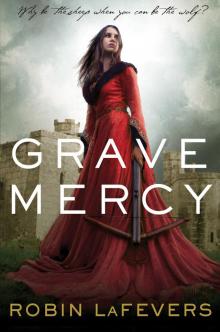 Grave Mercy
Grave Mercy Courting Darkness
Courting Darkness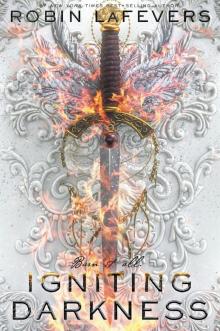 Igniting Darkness
Igniting Darkness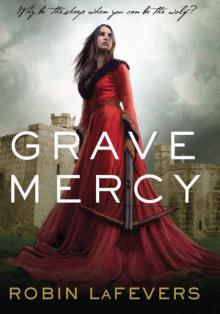 Grave Mercy (Book I) (His Fair Assassin Trilogy)
Grave Mercy (Book I) (His Fair Assassin Trilogy)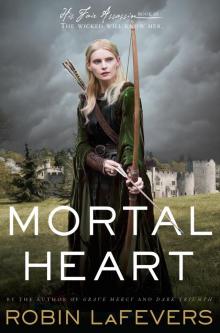 Mortal Heart
Mortal Heart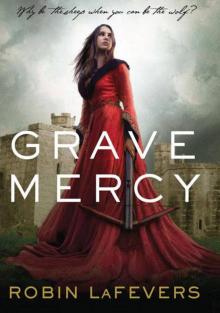 Grave Mercy (Book I): His Fair Assassin, Book I (His Fair Assassin Trilogy)
Grave Mercy (Book I): His Fair Assassin, Book I (His Fair Assassin Trilogy) Dark Triumph (His Fair Assassin #2)
Dark Triumph (His Fair Assassin #2)